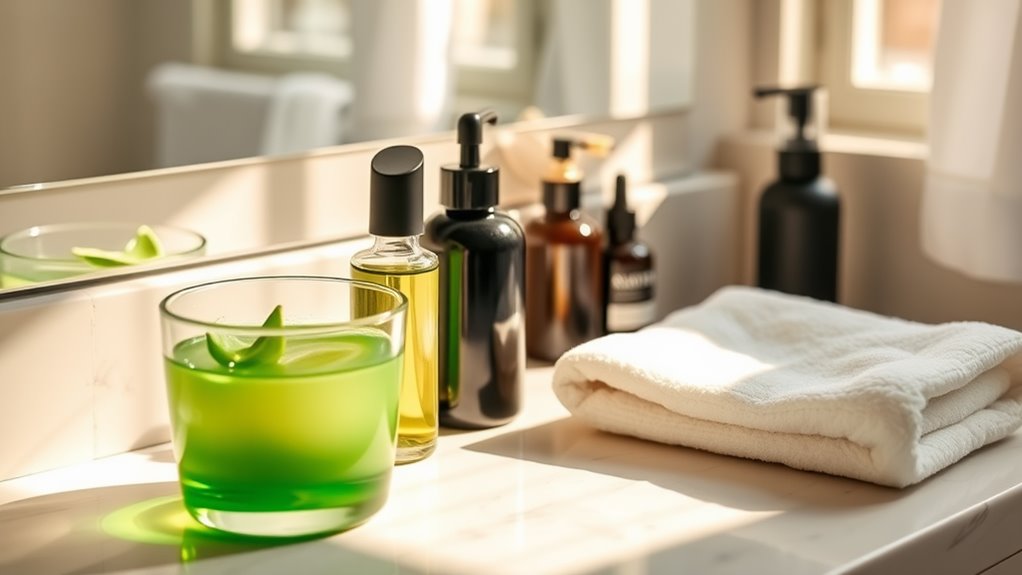7 Signs You’re Using the Wrong Products for Your Skin Type
If your skin feels tight or dry, you might be using the wrong products. Frequent breakouts and dull, lifeless skin signal a mismatch in your routine. Increased sensitivity or redness indicates irritation from harsh ingredients. If makeup doesn’t apply smoothly or you notice oily patches, your products may not suit your skin type. Early signs of aging can also appear due to heavy formulas. Understanding these signs is essential for your skincare health, and you’ll find more insight ahead.
Your Skin Feels Tight or Dry
Have you ever noticed that your skin feels tight or dry after using certain products?
This discomfort often signals that you’re using the wrong products for your skin type. Specific ingredients, like alcohol or harsh exfoliants, can strip your skin of essential moisture, leading to that tight sensation. Your skin might be signaling for hydration, and if you ignore these cues, you risk exacerbating dryness and irritation. In fact, skipping moisturizer can worsen these symptoms and lead to long-term skin health issues, emphasizing the importance of proper hydration practices. Always choose products formulated for your skin type, whether oily, dry, or combination, to maintain balance and health. Understanding your skin’s unique needs is essential for achieving and retaining a radiant complexion.
2. You Experience Frequent Breakouts
If you experience frequent breakouts, it might be due to using products that don’t match your skin’s needs.
Heavy formulas can clog pores, while certain ingredients may exacerbate your skin’s oiliness or irritation.
Additionally, inadequate hydration can trigger your skin to produce even more oil, leading to greater breakouts. Incorporating products with key ingredients for acne-prone skin can help reduce breakouts and improve your overall skin health.
Product Ingredient Mismatch
Are you struggling with frequent breakouts despite your best skincare efforts?
One possible culprit could be a product ingredient mismatch.
If you’re using products with heavy oils or comedogenic ingredients, they might be clogging your pores and triggering acne.
For instance, ingredients like lanolin or coconut oil can exacerbate breakouts in oily or acne-prone skin.
Instead, look for non-comedogenic formulations that include salicylic acid or benzoyl peroxide, which help clear pores and reduce inflammation.
Always check labels and choose products tailored to your specific skin type to keep breakouts at bay and promote a clearer complexion.
Overly Heavy Formulas
Using products that are too heavy for your skin type can lead to persistent breakouts, even when you think you’re following a good routine.
If you notice clogged pores and acne, it’s time to reassess your formulas.
Heavy creams and oils can overwhelm your skin, causing it to produce excess oil in response.
This imbalance often triggers breakouts.
Look for lightweight, non-comedogenic options that suit your unique skin needs.
Ingredients like gel-based moisturizers or water-rich serums can hydrate without suffocating your pores.
Switch to these alternatives, and you may find your skin clears up noticeably.
Inadequate Skin Hydration
How often do you find yourself battling breakouts despite a diligent skincare routine?
If your skin feels tight or looks dull, you might be experiencing inadequate hydration.
When your skin lacks moisture, it can overproduce oil, leading to clogged pores and breakouts.
Research shows that well-hydrated skin maintains a balanced barrier, reducing acne flare-ups.
Switch to lightweight, hydrating products containing hyaluronic acid or glycerin to replenish moisture without clogging pores.
Remember, even oily skin needs hydration; neglecting it can worsen breakouts.
Assess your products and prioritize hydration to achieve clearer, healthier skin.
Your breakout battle might just need a moisture boost!
3. Your Skin Looks Dull and Lifeless
What do you see when you look in the mirror? If your skin appears dull and lifeless, it’s a sign you might be using the wrong products. Your skin needs specific ingredients to regain its glow. Here’s a quick comparison of common ingredients to help you understand what might be missing:
| Ingredient | Function | Skin Type |
|---|---|---|
| Vitamin C | Brightening | All skin types |
| AHAs | Exfoliation | Oily and combination |
| Hyaluronic Acid | Hydration | Dry and sensitive |
Revamping your routine with suitable products could restore your skin’s radiance. Additionally, incorporating simple daily routine changes can further enhance your skin’s vitality.
4. You Notice Increased Sensitivity or Redness
Even if your skin has regained some glow, increased sensitivity or redness can signal that your products aren’t right for you.
These reactions often indicate irritation caused by harsh ingredients or allergens in your skincare routine.
If you’re experiencing stinging, burning, or a flushed appearance after application, it’s time to reassess your product choices.
Sensitive skin types typically require gentler formulations, free from fragrances and alcohol.
Look for soothing ingredients like aloe vera or chamomile. Post-skincare irritation can often be alleviated by identifying and eliminating irritants from your regimen.
Ignoring these signs can lead to long-term damage, so listen to your skin and switch to products tailored specifically for your unique skin type.
5. Makeup Doesn’t Apply Smoothly
Have you ever noticed that your makeup doesn’t glide on as smoothly as it should? This could indicate that you’re using the wrong products for your skin type. Different skin types require specific formulations to achieve seamless application. Using products that clash with your skin type can lead to patchy application and uneven texture. To avoid issues like flaky foundation, evaluate your products and switch to formulations designed for your specific skin needs for a flawless look.
| Skin Type | Recommended Product |
|---|---|
| Oily | Oil-free foundation |
| Dry | Hydrating primer |
| Combination | Balancing tinted moisturizer |
6. You Have Oily Patches or Shine
If you’re experiencing oily patches or excessive shine, it often points to improper product ingredients or an inadequate moisturization routine.
Using heavy formulas can exacerbate the problem, leading to clogged pores and increased oil production.
To achieve a balanced complexion, it’s essential to choose the right products tailored to your skin’s needs. Understanding your skin type can greatly help in selecting appropriate products.
Improper Product Ingredients
Why do some products leave you with oily patches or an unwanted shine? Often, it’s due to improper ingredients that don’t suit your skin type.
Heavy oils, silicones, and certain alcohols can clog pores, exacerbating oiliness.
For instance, products labeled “hydrating” might contain occlusive agents that trap moisture but also increase shine.
Instead, look for lightweight, non-comedogenic formulas with ingredients like salicylic acid or niacinamide, which help regulate oil production.
By understanding your skin’s needs and avoiding those heavy or pore-clogging components, you can achieve a balanced complexion without the excess shine.
Choose wisely for clearer, healthier skin.
Inadequate Moisturization Routine
How often do you consider the role of your moisturization routine in your skin’s oiliness?
If you’ve got oily patches or shine, inadequate hydration might be the culprit.
When your skin lacks moisture, it compensates by producing excess oil, leading to that unwanted shine.
It’s essential to choose a lightweight, non-comedogenic moisturizer that hydrates without clogging pores.
Look for ingredients like hyaluronic acid or glycerin, which effectively retain moisture without adding greasiness.
Regularly moisturizing helps balance your skin’s oil production, resulting in a healthier complexion.
Don’t skip this essential step; a proper routine is essential for maintaining skin health.
Overuse of Heavy Formulas
Overusing heavy formulas can exacerbate oily patches and shine on your skin. These products often clog pores and lead to breakouts, making your skin appear greasier. Instead, opt for lightweight, non-comedogenic alternatives that balance hydration without overwhelming your skin.
| Product Type | Heavy Formula Example | Lightweight Alternative |
|---|---|---|
| Moisturizer | Creams | Gel-based formulas |
| Sunscreen | Thick lotions | Spray or gel types |
| Foundation | Cream foundations | Tinted moisturizers |
| Cleanser | Oil cleansers | Foaming or gel cleansers |
| Primer | Silicone-based | Water-based primers |
Evaluate your routine to achieve a healthier complexion.
7. Your Skin Shows Early Signs of Aging
Are you noticing fine lines and wrinkles appearing sooner than expected? This could signal that your skincare products aren’t suited for your skin type.
Using the wrong formulas, especially those high in alcohol or heavy oils, can accelerate aging.
If your skin feels dry or irritated, it’s likely time to reassess your routine.
Look for products rich in antioxidants, peptides, and hyaluronic acid, which help hydrate and promote collagen production.
Regularly exfoliating can also improve skin texture and clarity. Avoiding common anti-aging mistakes is crucial for maintaining skin health.
Addressing these signs early can help maintain a youthful appearance and prevent further damage. Choose wisely for better skin health.

